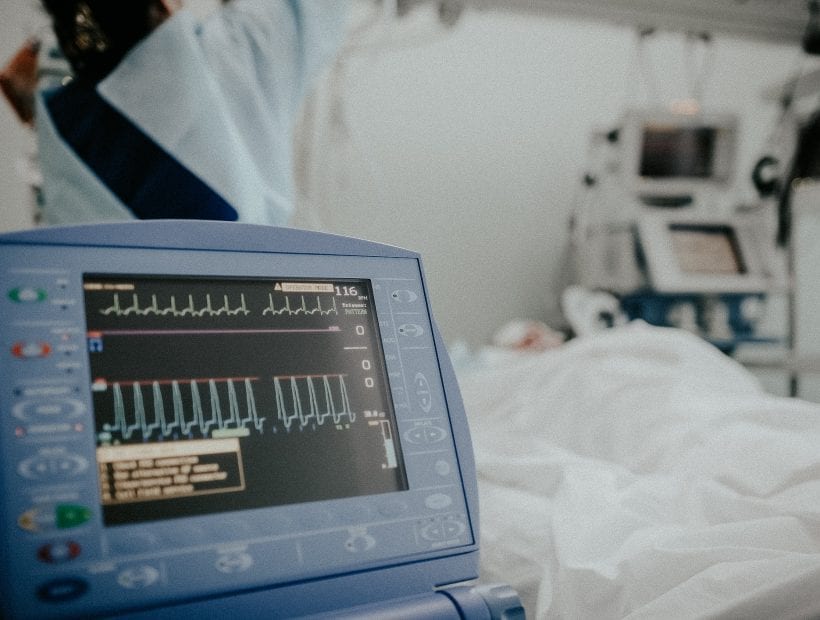Travel Nurse Career Guide: Progressive Care Unit (PCU) Nursing

PCU and Tele nurses monitor critically ill patients whose conditions may quickly worsen to critical but are more-or-less stable. Progressive care nurses utilize different devices and technology to monitor patients and must be able to analyze data and react with confidence. To work in Tele or PCU units, you’ll need to be a critical thinker who can make rapid decisions. Whether you’re a new grad nurse thinking about travel nursing or an experienced PCU or Tele nurse stepping into travel, this guide will give you insight into what it’s like working on the floor in facilities across the country from someone who has been in your shoes.
- Part 1: What is a Progressive Care Travel Nurse?
- Part 2: PCU & Tele Experience & Certifications
- Part 3: What is it Like to Work as PCU or Tele Travel Nurse?
- Part 4: Progressive Care Travel Nurse Advice
- Part 5: Who to Follow & Progressive Care Resources

Part 1: What is a Progressive Care Travel Nurse?
These nurses work in a progressive care unit and work. PCU nurses care for patients who require close monitoring and frequent assessment. While these patients are not ill enough for the ICU, their status could change quickly requiring solid critical care skills. Similarly, Tele nurses care for patients whose conditions may quickly worsen to critical and analyze data from monitoring devices and technology. So what’s the difference? Tele nurses primarily work with cardiac monitoring and drips and usually work within larger nurse-to-patient ratios. Both units require bedside vigilance and rapid intervention.
PCU RN, Sparky
What is it like to work as a PCU nurse in facilities all over the country? We asked TNAA Ambassador Sparky to tell us all about his specialty:

“I initially worked on a floor that covered a mix, from Med Surg to PCU beds, but we specialized in strokes. We were the fall back for all the other floors, so it was an excellent floor to be well rounded and get lots of experience. PCU, I have found, is my favorite because it’s still critical care. But, the way that I can interact with my patients and also they are still sick with lots of things to learn. I prefer units where I can get a lot of drips to titrate (within a range) with heart patients and respiratory distress. These units allow me to use my nursing judgment and think about what is going on and why. I have worked in Med Surg and Tele, but due to the level of care, you are limited in the types of interventions you can do.
ICU/ER people have asked me why I don’t want to go into these fields. And the truth is, I don’t like the turnover of the emergency room and ICU I have fewer interactions with the patients. I love my current level of care.”
PCU RN, Ethan
What is it like to work as a PCU nurse in facilities all over the country? We brought Ethan to our HQ to tell us all about traveling in his specialty:
View this post on Instagram
“Back in nursing school, I worked as a nurse intern at a local hospital in the float pool department and loved it. I loved not knowing where I’d work that day and all the opportunities to see and learn from different units in the hospital, anything from ED to Med Surg. My favorite units to work on were critical care CICU and CICU Step Down. I really enjoyed seeing the patients come in with problems, get fixed up, and then discharged. PCU patients usually have a laundry list of medical issues, on top of the reason for their admission, and I enjoy getting them from admission and seeing them well enough to go back home. From an educational standpoint, I think PCU is a great learning opportunity to be able to see a wide range of cases and surgeries. My first nursing job was strictly cardiac, and getting bottlenecked into one specific thing in nursing can be easy; PCU has a way of keeping you well rounded in your clinical skills.
With monitoring, nothing is ever simple. I love getting to be part of a team managing multiple issues at one time. While it can be challenging, the best part is the reward of seeing patients progress and get better. Seeing patients get well enough to go home is super satisfying. I also enjoy the camaraderie. I have never worked on a PCU floor where the nurses don’t offer help or bounce ideas and past experience off each other. My coworkers from my Charleston SC assignment are the best team of nurses I’ve worked with, day shift and night get along so well.
Tele RN, Rainier

“I started my career in Tele simply because it was easy to find travel jobs — I travel with my wife Amy and we like to work the same unit. Tele/neuro was the unit that called me back when applying for jobs. It’s a need. While I miss working in the ER, I’m quite useful on tele and med surg floors. It can be interesting when it comes to meeting new coworkers. This specialty requires you to trust your coworkers and vice versa during emergencies. Both parties aren’t familiar with one another’s strengths and weaknesses that could be detrimental during a code. One aspect I really enjoy is working with doctors who specialize in a certain part of the body and learning from them.”
Part 2: PCU & Tele Experience & Certifications
To work as a travel nurse, you need at least 1 year of experience in an acute care facility. And PCU and Tele units are no different. Most facilities want to see that you have had time to develop your skills before you travel as you often will have limited orientation on assignment.

Most PCU and Tele nurses hold the following certifications:
- BLS, Basic Life Support
- ACLS, Advanced Cardiac Life Support
- NIH, Stroke Certification from NIHSS
Many PCU and Tele nurses build their credentials with the following certifications
Part 3: What is it Like to Work as a PCU or Tele Travel Nurse?

“My travel experience has always been a good one. The first week it feels like a gauntlet. You’re expected to know everything but have no idea how the floor or system works. From my contracts, the staff is conscious and considerate of this, which helps you acclimate to your new work environment. Patient care is the same everywhere, and management is concerned about the same things — infection, safety, meeting outcomes, etc. Usually, the only thing you really need to learn is the floor specific procedures. For example, before my Charleston contract, I had never taken care of an ACDF surgery patient, but now I have, and I know what to expect of those patients post-op. However, I do still refer to it as the alphabet surgery jokingly.
Be ready to float. As a traveler, you’re usually floated first, but being flexible is part of, or in my opinion, should be a part of being a travel nurse. Most often, I’ll float to Tele, but on occasion, I’ll get floated to ICU to take PCU transfers waiting on beds to free up an ICU nurse — which is my favorite place to float. — Ethan
Part 4: Progressive Care Travel Nurse Advice
With several travel assignments under their belts, Ethan and Rainier offered advice for new travel nurses working progressive care:
- Be confident in what you already know. This is by far my most significant piece of advice. Your environment is going to change on every contract. The skills and knowledge you know are your biggest asset and the reason you were hired on that contract. Don’t be intimidated by a new charting system; you can always make a nursing note if you’re unsure on the click charting.
- Be flexible. Try to never, intentionally or unintentionally, give the impression that you’re better than the staff. Offer to help your tech, don’t complain if you have to float every now and then (use it as a chance to meet nurses on the other units) it can be hard to make friends in a new town. Help another nurse who’s late on meds from a rocky start to shift.
- Never be afraid to ask for help. There are no stupid questions. There will be times when your brain freezes or perhaps you’re tired or encounter something new. There should be someone in the hospital that can answer any of your questions if need be.
- Don’t be scared to transfer to another floor or unit. In my opinion, one of the worst things a nurse can do to themselves is get burnt out from staying in the same specialty, especially when you’re no longer happy or learning. I worked Tele for 6 years before I moved to the ER. Going to the ER, I learned a lot of new skills and worked with more upbeat staff. It did wonders for me mentally. The new things I learned were utilized on my subsequent travel assignments. Don’t be afraid to change it up!
- Bring the coffee. It’s a great ice breaker when you start and a good way to start the shift each night. We all know the hospital coffee isn’t the greatest…
Part 5: Who to Follow & Progressive Care Resources
- STN: Society of Trauma Nurses
- AACN: American Association of Critical-Care Nurses
- @exceptionalnurses on Instagram
- AACN on Facebook
- Podcasts:
- Nurse Instagram Accounts– beware, these accounts can get a little wild:
- @nurselifeRN
- @nursesofinstagram
- @nurseabnormalities
- Instagram Hashtags — follow these hashtags to find relevant content shared amongst your progressive care peers
Search our current PCU travel nurse jobs!







